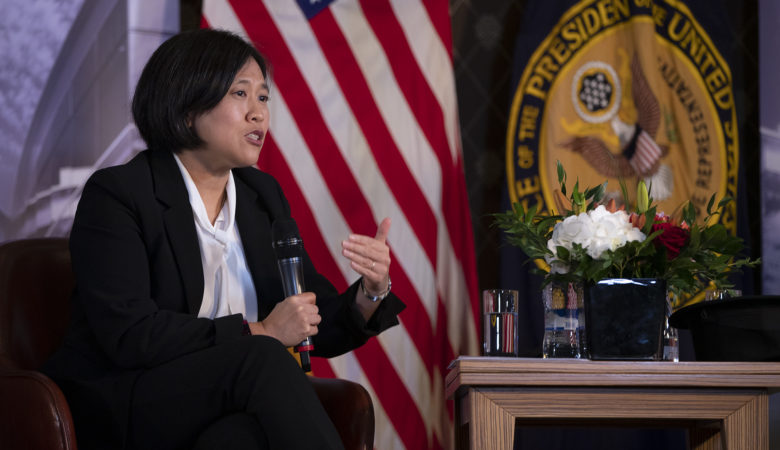USTR Jabbed for Blocking Congress’s Access to TRIPS Waiver Negotiations
At a pair of congressional hearings last month, legislators criticized U.S. Trade Representative Katherine Tai for her continued efforts to negotiate away American intellectual property rights without consulting Congress.
The annual hearings, hosted by the House Ways & Means Committee and the Senate Finance Committee, centered on the Biden administration’s 2022 Trade Policy Agenda. At last year’s hearings, Ambassador Tai faced numerous questions and criticisms about President Biden’s efforts to embrace a waiver of the Trade-Related Aspects of Intellectual Property Rights (TRIPS) agreement at the World Trade Organization (WTO) that provides a world minimum of IP protections.
The TRIPS waiver, originally proposed by India and South Africa and endorsed last year by the Biden administration, would strip intellectual property rights from innovators such as Pfizer and Moderna and allow generic versions of their vaccines to be produced by firms without licensing agreements. In March, USTR announced that they had reached a “compromise outcome” on the proposal with India, South Africa, and the European Union which would reportedly allow certain countries to violate the patent protections of COVID-19 vaccine technology. In the most recent development, on Tuesday the WTO announced that an “outcome document” has resulted from talks between the four negotiators, and WTO Director-General Ngozi Okonjo-Iweala expressed her hopes that a deal could be finalized by June.
Despite having arrived at an apparent “compromise,” USTR has not yet shared the text of the agreement with the public nor with Congress. Almost a dozen members of the committees made clear to Ambassador Tai that the ideological reasons behind the TRIPS waiver were wrong and that USTR’s handling of the process has been inappropriate.
“At last year’s Trade Agenda hearing, Ambassador Tai, you stated that you would brief this committee before and after each negotiating session with respect to a waiver of the WTO TRIPS agreement. That hasn’t happened,” said Senate Finance Committee Ranking Member Mike Crapo (R-Idaho) in his opening statement. “We need to see the document and we need to ask questions, because that is what respect for the Constitution requires.”
Representative Vern Buchanan (R-Fla. 16) discussed a letter to President Biden about the waiver proposal that he sent along with 116 members of the House of Representatives, echoing, “We haven’t heard a response back from the President or yourself.”
Even Democratic members of the committees expressed deep dissatisfaction with the Biden administration’s handling of the TRIPS waiver process. Senator Bob Menendez (D-N.J.) chastised Ambassador Tai for keeping Congress “in the dark” about her negotiations, arguing, “In your testimony, you said Congress is your constitutional partner in trade, but from my perspective you haven’t acted that way.”
“We need consultation apart from hearings,” Senate Finance Committee Chairman Ron Wyden (D-Ore.) clarified.
Committee members argued that the waiver is unnecessary today because the supply of vaccines has already outstripped demand, as outlined in Property Rights Alliance’s “TRIPS Waiver Fast Facts” document.
“20 billion doses will be produced this year, more than enough to achieve the World Health Organization vaccination target,” noted Senator Crapo. “The administration, however, has not shared with the public any evidence as to why a waiver will get shots into the arms any faster.”
Representative Lloyd Smucker (R-Pa. 11) added that “multiple countries have had to dispose of expired doses” of the vaccines, due to lack of demand amid rapidly increased supply. Indeed, Property Rights Alliance has tracked nearly a billion doses that have been destroyed because they expired before they could be used, indicating that challenges lie with logistics and the drop in vaccine demand.
Congressmen also expressed their concern over how seizing intellectual property rights today would undermine innovation and medical responses to future pandemics. “Protection is there because it drives innovation, and in this case it drives treatments and cures,” argued Representative Dr. Brad Wenstrup (R-Ohio 02). “If we take that away, we are very much going to limit our advancements.”
Representatives Darin LaHood (R-Ill. 18), Vern Buchanan, and Dr. Drew Ferguson (R-Ga. 03) added that a TRIPS waiver could result in handing over key American intellectual property to national adversaries like China.
Rep. LaHood noted that without a copy of USTR’s compromise agreement, Congress cannot have the oversight to determine whether countries receiving American IP under the agreement will be “providing that IP to China, directly or through Chinese [state-owned enterprises].” These additional concerns indicate that a TRIPS waiver could not only be a threat to the economy and to long-term health outcomes, but to national security as well.
“Again, we want as many people to get vaccinated as want to get vaccinated, but giving away the intellectual property, to me, does not seem like the right way to do this,” concluded Rep. Ferguson.
Property Rights Alliance, in partnership with 30 organizations from 15 countries, released an international coalition letter earlier this year opposing the implementation of a TRIPS waiver.
Photo Credit: United States Mission Geneva on Flickr

